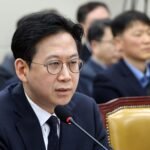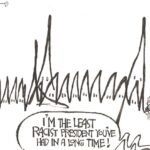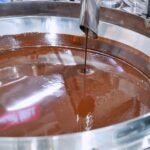Paik Jong-won, founder and CEO of TheBorn Korea, meets the press ahead of the firm’s IPO
TheBorn Korea Inc., a leading South Korean food and beverage group operated by TV celebrity and chef Paik Jong-won, is looking to acquire soy source companies and expand its overseas business once its 102 billion won ($73.7 million) initial public offering is completed.
While unveiling the company’s business strategy at a media briefing on Monday, the chief executive said over 90% of the funds raised through the IPO will be used to purchase or invest in shares of retail food companies and food tech firms, to expand its food distribution business, including the home meal replacement (HMR) business.
“One of the main reasons for our IPO is the distribution business in which we are actively investing and interested,” he told reporters. “In Korea, we’ll explore various distribution channels, including meal kits and sauces.”
He said the company is particularly interested in acquiring sauce companies to create synergy with its franchise business.
TheBorn Korea earlier said its businesses are similar to those of major domestic food suppliers such as CJ Seafood Corp., Daesang Corp. and Shinsegae Food Inc., indicating its goal of becoming a comprehensive food company.
Paik Jong-won
IPO SCHEDULE
After a two-day public subscription period ending this Tuesday, TheBorn Korea will go public on Nov. 6.
On the first retail subscription day on Monday, about 240,000 individual investors subscribed to the IPO with some 500 billion won in deposits, representing a competition ratio of 32 to 1.
The competition among institutional investors was so intense during the bookbuilding last week that the IPO price was set at 34,000 won apiece, 21% higher than the indicative range of 23,000 won and 28,000 won.
Korea Investment & Securities Co. and NH Investment & Securities are the lead managers of the IPO.
TheBorn Korea plans to float 2,845,200 new shares on the main Kospi bourse, which account for 19.67% of its total outstanding shares.
The company expects to raise 102 billion won through the IPO, with its market capitalization estimated at 491.8 billion won.
The company is relaunching its IPO after it withdrew its plan in 2018 amid tepid investor interest in the domestic food and beverage industry.
HEAVY RELIANCE ON PAIK
TheBorn Korea heavily relies on Paik, also spelled Baek Jong-won in local media, which like to call him “Gordon Ramsay of South Korea.”
A famous restauranteur and the main host of the popular television series Baek Jong-won’s Alley Restaurant, he produced his own original series Paik’s Spirit with the world’s top streaming service Netflix Inc. in 2021.
Established in January 1994, TheBorn Korea operates 25 restaurant and café brands in domestic and global markets, including Bornga, Saemaeul Restaurant, Paik’s Bibim, Hanshin Pocha and café franchise Paik’s Coffee. It also operates Hotel TheBorn Jeju on the resort island of Jeju.
Paik Jong-won (center), CEO of Theborn Korea, a South Korean food and beverage company
Paik, founder and chief executive of TheBorn Korea, owns a 76.69% stake in the company as of the end of 2023, followed by Vice President Kang Seok-won, who holds a 21.09% stake.
The food and beverage chain operator posted 25.6 billion won in operating profit in 2023, down 0.6% from the previous year. Its sales rose 45.5% on-year to 410.7 billion won last year. Net profit gained 31% to 20.9 billion won.
In the first half of this year, the company’s domestic sales reached 209 billion won, accounting for nearly 99% of its entire sales.
The franchise business is the primary revenue source, constituting 177.1 billion won, or 84% of its total sales.
By Seok-Cheol Choi
dolsoi@hankyung.com
In-Soo Nam edited this article.














